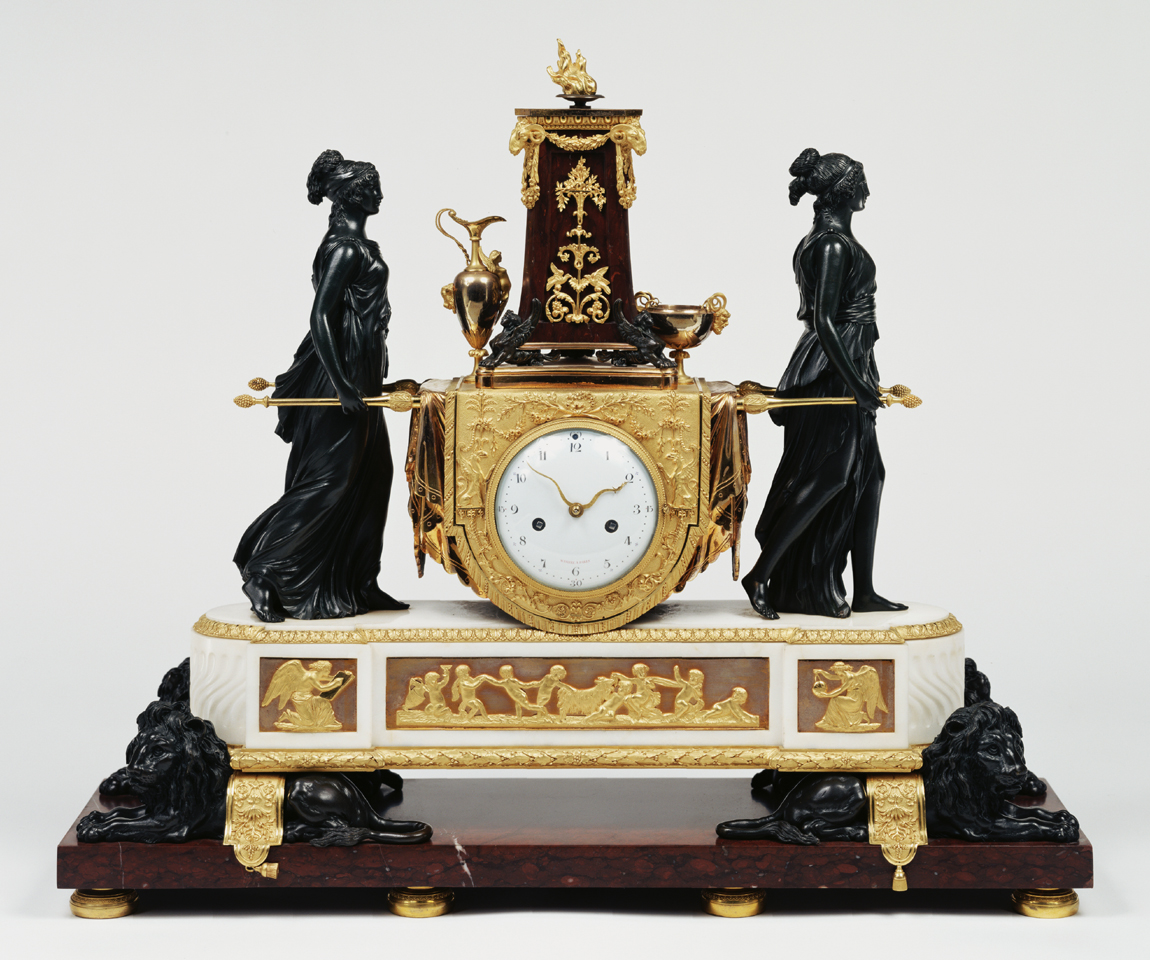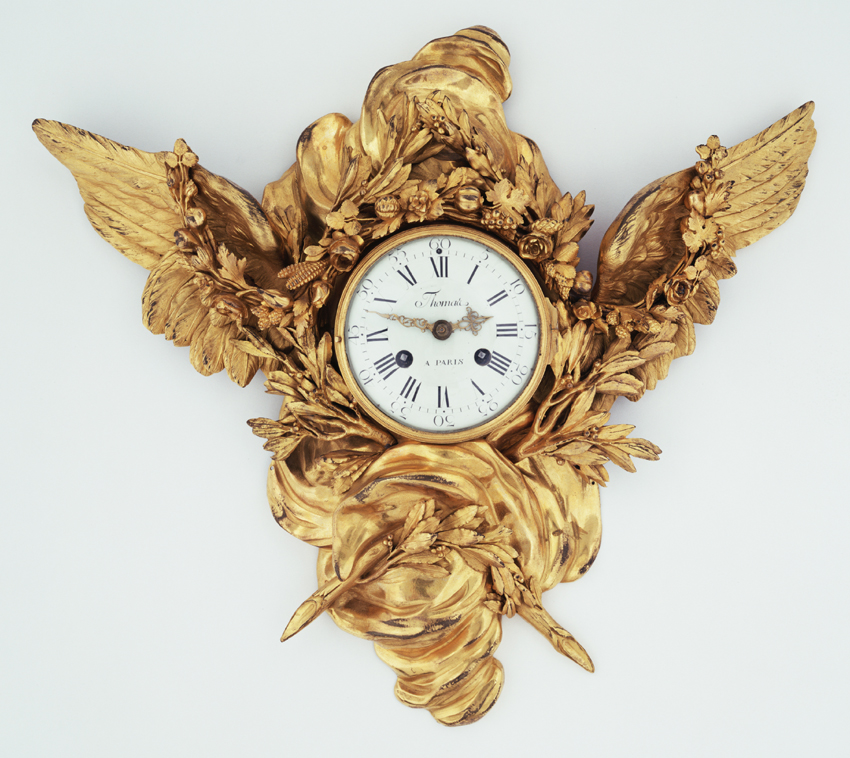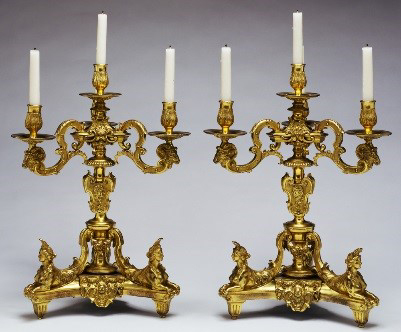
Mantle clock, about 1789, clock case attributed to Pierre-Philipe Thomire (French, 1751–1843, master 1772), movement by Charles-Guillaume Maniere (French, d 1812, master 1778); patinated and gilt bronze, enameled metal, glass, white marble, griotte marble, 21¾ by 253⁄8 by 7½ inches. The J. Paul Getty Museum, Los Angeles, partial gift of Dr Horace W. Brock in memory of Pascal Izarn.
LOS ANGELES — The J. Paul Getty Museum has announced the acquisition of an important collection of Eighteenth Century French decorative arts assembled by Dr Horace Wood “Woody” Brock, a foremost economist. The acquisition is a combined gift and purchase.
The 31 works of art include seven clocks; six gilt-bronze-mounted porcelain, feldspar and porphyry objects; five works in gilt-bronze, including a pair of candelabra, two sets of firedogs and two sets of decorative vases; a carved giltwood console table; a porcelain inkstand and a leather portrait medallion of Louis XIV. The collection substantially enhances the Getty Museum’s holdings of French decorative arts, renowned as one of the most important outside France.
“These exquisite objects constitute the most significant acquisition of French decorative arts made by the museum in many years,” said Timothy Potts, director of the J. Paul Getty Museum. “Produced in the sophisticated artistic culture of Eighteenth Century Paris, these extraordinary works epitomize the skill and artistry that made the French court and aristocratic life the epitome of elegant extravagance, and the envy of collectors throughout Europe. We are deeply grateful to Dr Brock for his generosity in enriching our collection with this important gift and purchase.”
Dr Brock has been collecting French and English decorative arts and Old Master drawings for the last 30 years. He began lending decorative arts objects to the Getty Museum in 1997 and made several long-term loans through 2008. Since being lent to the Getty, these objects have been on continuous display in the European decorative arts galleries in the South Pavilion Plaza Level at the Getty Center.

Wall clock, about 1785, unknown maker, clock movement probably by Nicolas Thomas (French, d after 1806, master 1778); gilt bronze, enameled metal, glass, 19½ by 22 inches. The J. Paul Getty Museum, Los Angeles, partial gift of Dr Horace W. Brock in memory of Philippe Kraemer.
“The objects collected by Dr Brock are sumptuous and refined pieces of the highest quality that have significantly enriched the French Decorative Arts galleries since the opening of the Getty Center in 1997,” said Anne-Lise Desmas, curator and department head of sculpture and of decorative arts. “They have become key components in the museum’s recreation of French Eighteenth Century interiors and have played an essential role in our visitors’ experience and understanding of this critical period of European art.”
The recently acquired works were created as luxury objects that would have decorated the lavishly furnished residences of the French aristocracy and bourgeoisie. Many, such as the clocks, candelabra and the inkstand, were made for practical use, but their sophisticated design and rare materials were also meant to demonstrate the wealth, prestige and refined taste of their owners. The objects represent the full range of decorative styles practiced during the Eighteenth Century, from the grandeur and opulence of late baroque and Régence through the intimate brilliance of the rococo to the severe restraint of the neoclassical.
Highlights of the collection include a pair of gilt-bronze candelabra, attributed to the prominent baroque cabinetmaker André-Charles Boulle, called during his lifetime “the most skillful artisan in Paris.” Two early rococo lidded jars include exotic motifs from the Far East; porcelain and hardstones were avidly collected and prominently displayed, mounted with gilt bronze to highlight the beauty and rarity of porphyry and feldspar.

Candelabrum, about 1700, attributed to André-Charles Boulle (French, 1642–1732, master before 1666); gilt bronze, 19½ by 26¼ inches, partial gift of Dr Horace W. Brock in honor of Laurent and Olivier Kraemer.
A passionate collector of decorative arts, Brock knows the Getty Museum’s collection intimately. Consequently, he has given works that fit well in the context of the museum. For example, the fine gilt-bronze wall clock in the form of a winged clock face adds an important model not currently represented in the collection and the imposing neoclassical mantel clock with vestal virgins, attributed to Pierre-Philippe Thomire, joins a significant group of objects from early in that artist’s career already belonging to the museum.
Most of the donations have been made in honor of Theodore Dell, an important scholar who cataloged the French furniture and gilt bronzes at the Frick Collection in New York. Dell was a consultant to Gillian Wilson, former Getty Museum curator of decorative arts, and helped Dr Brock in the formation of his collection. Dell assembled an important library of sales catalogs, journals, magazines, books and museum catalogs, all focused on French decorative arts, which he donated to the Bard Graduate Center Library in 2012.
Other objects have been donated to the Getty in honor of Gillian Wilson, as well as knowledgeable dealers in decorative arts such as Leon Dalva, Will Iselin, Pascal Izarn, Laurent and Olivier Kraemer, and Martin Zimet; and in memory of Frank Berendt, Philippe Kraemer and François Léage.
“The J. Paul Getty Museum contains a superb collection of the decorative arts of Eighteenth Century France, a period in which the quality of design and craftsmanship arguably reached its historical zenith. My hope is that the objects I have collected will permanently enhance this already remarkable collection,” says Brock.
The J. Paul Getty Museum is at 1200 Getty Center Drive; for information, 310-440-7330 or www.getty.edu/museum.

